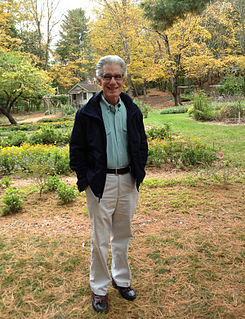A Quote by Hans Urs von Balthasar
Prior to an individual's encounter with the love of God at a particular time in history, however, there has to be another, more fundamental and archetypal encounter, which belongs to the conditions of possibility of the appearance of divine love to man.
Related Quotes
After my engagement with Muslim friends, I pray more than I used to pray. My prayer life has been enriched by my encounter with some Muslims, encouraged by their devotion and also enriched by the ways in which they pray. Have I compromised in this way at all? No, to the contrary, I've gone deeper in my faith and I think my love for God has been deepened and made more intelligent in a sense, more rich by that very encounter.
Actual knowledge is identical with its object: in the individual, potential knowledge is in time prior to actual knowledge, but in the universe as a whole it is not prior even in time. Mind is not at one time knowing and at another not. When mind is set free from its present conditions it appears as just what it is and nothing more: this alone is immortal and eternal (we do not, however, remember its former activity because, while mind in this sense is impassible, mind as passive is destructible), and without it nothing thinks.
If you find it difficult to love the human in someone, then love the divine in him. The divine in him is God. God exists in that person just as God exists in you. To love God is extremely easy because God is divine and perfect. Each time you look at an individual, if you can consciously become aware of God's existence in him, then you will not be disturbed by his or her imperfections or limitations.
And the law of God is written in every heart, and it is there that he manifests himself; And in infinite love, according to our necessities, states, conditions. And as we are all various and different from one another, more or less, so the law by the immediate operation of divine grace in the soul, is suited to every individual according to his condition.
[T]he "home" represents the most precious human treasures, that of encounter, that of relations among people, different in age, culture and history, but who live together and together help one another to grow. For this reason, the "home" is a crucial place in life, where life grows and can be fulfilled, because it is a place in which every person learns to receive love and to give love.
The unbreakable bond between love of God and love of neighbor is emphasized. One is so closely connected to the other that to say that we love God becomes a lie if we are closed to our neighbor or hate him altogether. Saint John's words should rather be interpreted to mean that love of neighbor is a path that leads to the encounter with God, and that closing our eyes to our neighbor also blinds us to God.
Whenever we encounter the Infinite in man, however imperfectly understood, we treat it with respect. Whether in the synagogue, the mosque, the pagoda, or the wigwam, there is a hideous aspect which we execrate and a sublime aspect which we venerate. So great a subject for spiritual contemplation, such measureless dreaming - the echo of God on the human wall!





































